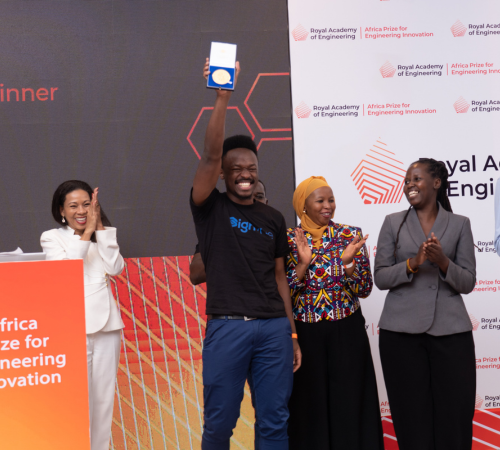 Elly Savatia when he won the 2025 Africa Prize for Engineering Innovation, which comes with a £50,000 cash award.
Elly Savatia when he won the 2025 Africa Prize for Engineering Innovation, which comes with a £50,000 cash award.
A Kenyan engineer has won a major
prize for developing an AI-powered app that translates speech into sign
language using lifelike 3D avatars.
The innovation aims to make communication easier for people who are deaf or hard-of-hearing and address the shortage of sign language interpreters in classrooms, workplaces and public services.
Elly Savatia won the 2025 Africa Prize for Engineering Innovation, which comes with a £50,000 cash award.
Savatia’s app, known as Terp 360, draws from a growing dataset of more than 2,300 locally recorded signs developed with Kenya’s deaf community to ensure cultural relevance and natural expression. Using motion-capture technology, it offers more fluid, realistic signing than earlier digital tools.
“I'm totally grateful for this and it is a testament to the innovative assistive technology work that is coming from Africa. I'm really looking forward to the excellence that will come out of Signvrse, the rest of the shortlistees and the African continent,” Savatia said, according to a statement from the Royal Academy of Engineering, which runs the Africa Prize through partial funding by the UK’s Department for Science, Innovation and Technology.
The award ceremony was in Dakar, Senegal.
Terp 360’s journey began when Savatia, who grew up in western Kenya, noticed during a robotics class that 300 deaf students relied on only one interpreter. The experience inspired him to build an accessible digital solution. Working with a small team at his company, Signvrse, he designed the app and collaborated with members of the deaf community to refine its vocabulary and gestures.
So far, Terp 360 has reached more than 2,000 deaf users, the statement said. Savatia’s team plans to expand into the business-to-business market, focusing on education, corporate and healthcare sectors, while extending the app’s vocabulary and reach to Uganda and Rwanda.
The £50,000 award will support the next phase of Terp 360.
Each finalist was evaluated on the strength and impact of their engineering solution, commercial viability, potential to scale, and quality of the team. The judging panel said they also assessed how effectively participants applied learning from the eight-month mentorship programme. This year’s judges included Rebecca Enonchong FREng (Chair), Sewu Steve Tawia, Richard Wylde FREng, Ian Shott FREng, Yewande Odumosu, and guest judge Marième Diop.
“This is exactly what the Africa Prize is all about. It's showcasing cutting edge innovations by Africans for the World,” said Rebecca Enonchong FREng, Chair of the Africa Prize judging panel.
Three other finalists—Vivian Arinaitwe (Uganda) for Neo Nest, Frank Owusu (Ghana) for Aquamet, and Carol Ofafa (Kenya) for E-Safiri—each received £10,000. A further £5,000 One to Watch award, chosen by the live audience, went to Rui Bauhofer of Mozambique for Eco-Plates, biodegradable plates made from recycled maize husks that germinate seeds once discarded.












